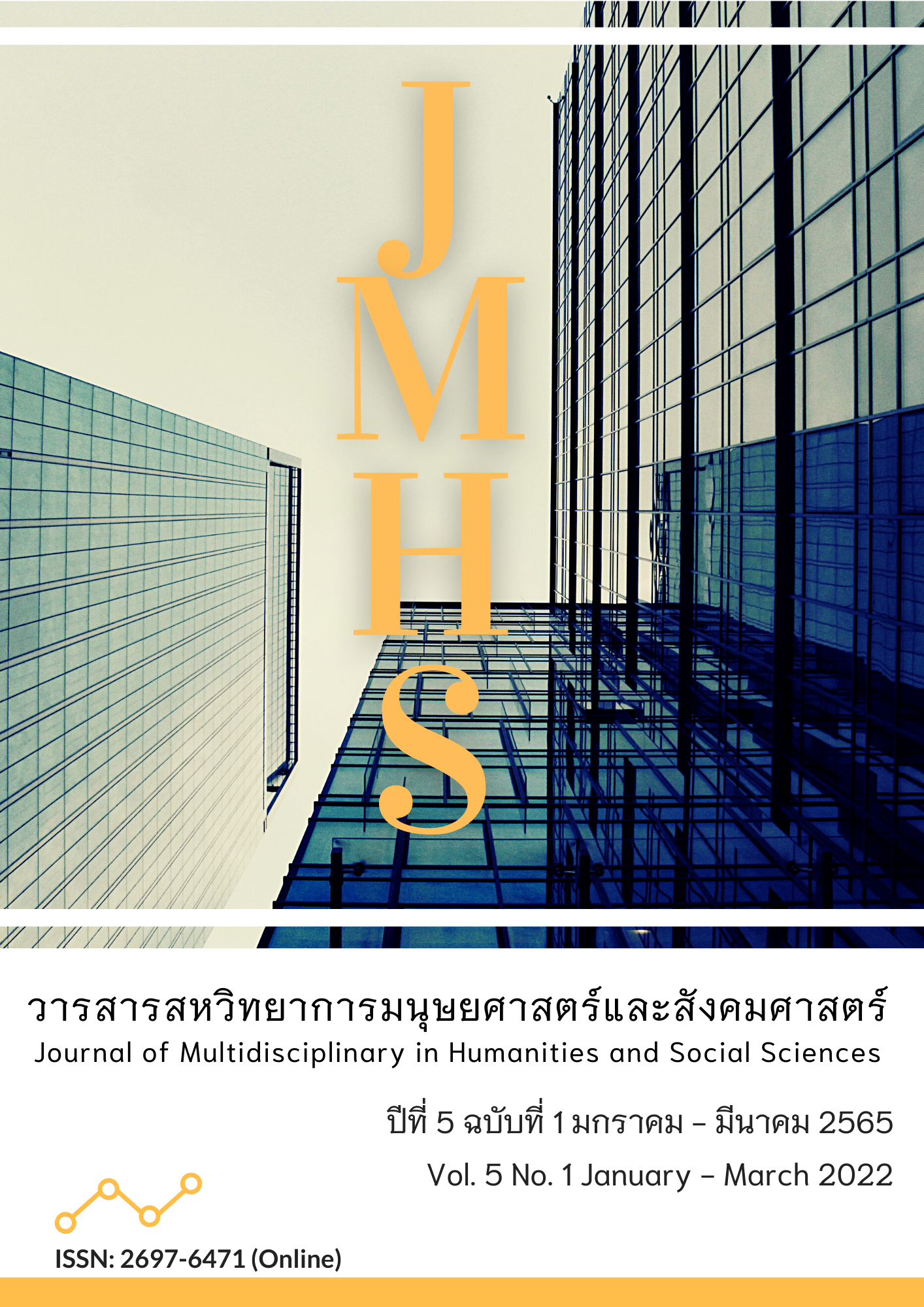Academic Leadership of Administrators Affecting Learning Organization of Basic Educational Institutions Administrators under Samut Prakan Primary Educational Sevice Area Office 2
Main Article Content
Abstract
The objectives of this research were to study: (1) the academic leadership of administrators and the learning organization of basic educational institutions under the Samut Prakan Primary Educational Service Area Office 2; and (2) the academic leadership of the administrators affecting the learning organization of the basic educational institutions under the Samut Prakan Primary Educational Service Area Office 2. The samples used in this research were 310 teachers in basic educational institutions under the Samut Prakan Primary Educational Service Area Office, Region 2. The research instrument was a 5-level questionnaire with a confidence value of 0.92. Data were analyzed by frequency, percentage, mean, Standard Deviation by Pearson correlation coefficient, and Stepwise regression analysis.
It was found that: (1) administrators of basic education institutions under the Samut Prakan Primary Education Service Area Office 2, the overall academic leadership was at a high level and the learning organizations of basic educational institutions, overall, were at a high level; and (2) the academic leadership of the administrators affected the learning organization of basic educational institutions. Sorted in order of importance: learning resources development (X4), learning management (X2), learning media development (X3), and educational supervision (X6). And all variables of 4 aspect were able to predict the Learning organization at 67.20 percent (R2 = 0.672) with a statistical significance at the .01 level, which could be written as a regression analysis equation as the following equation:
Raw score equation Y = 0.892+0.362(x4)+0.329(x2)+0.245(x3)+0.137(x6)
Standard score equation ZY = 0.381(Zx4)+0.352(Zx2)+0.268(Zx3)+0.131(Zx6)
Article Details

This work is licensed under a Creative Commons Attribution-NonCommercial-NoDerivatives 4.0 International License.
Views and opinions appearing in the Journal it is the responsibility of the author of the article, and does not constitute the view and responsibility of the editorial team.
References
กระทรวงศึกษาธิการ. (2552). คู่มือการดำเนินงานนโยบายเรียนฟรี 15 ปี อย่างมีคุณภาพ. กรุงเทพฯ: โรงพิมพ์ชุมนุมสหกรณ์การเกษตรแห่งประเทศไทย จำกัด.
ฉันทนา เพียตัวผู้. (2562). การศึกษาเจตคติของครูต่อการบริหารงานวิชาการของโรงเรียนในกลุ่มพานทอง 2 สังกัดสำนักงานเขตพื้นที่การศึกษาประถมศึกษาชลบุรี เขต 2 (สารนิพนธ์ปริญญาการศึกษามหาบัณฑิต). กรุงเทพฯ. มหาวิทยาลัยกรุงเทพธนบุรี.
ชนานาถ ปรีชาศิลป์. (2562). การศึกษาความคิดเห็นของครูผู้สอนต่อการบริหารงานวิชาการของโรงเรียนวัดราชโอรส สังกัดสำนักงานเขตพื้นที่การศึกษามัธยมศึกษา เขต 1(สารนิพนธ์การศึกษามหาบัณฑิต). มหาวิทยาลัยกรุงเทพธนบุรี.
บุญชม ศรีสะอาด. (2556). วิธีการทางสถิติส าหรับการวิจัย เล่ม 1 (พิมพ์ครั้งที่ 5). กรุงทพฯ: สุวีริยาสาส์น.
ปณิตา นราภิรมณ์ขวัญ. (2559). การจัดการความรู้ของมหาวิทยาลัยในกำกับรัฐและมหาวิทยาลัยเอกชน(วิทยานิพนธ์บริหารธุรกิจมหาบัณฑิต). กรุงเทพฯ. มหาวิทยาลัยธุรกิจบัณฑิตย์.
พนานันท์ โกศินานนท์. (2551). แนวทางการพัฒนาวิทยาลัยราชพฤกษ์สู่องค์กรแห่งการเรียนรู้.(วิทยานิพนธ์มหาบัณฑิต). กรุงเทพฯ. วิทยาลัยราชพฤกษ์.
ยุรพร ศุทธรัตน์. (2558). องค์การเพื่อการเรียนรู้. กรุงเทพฯ: จุฬาลงกรณ์มหาวิทยาลัย.
สำนักงานคณะกรรมการข้าราชการครูและบุคลากรทางการศึกษา. (2553). หลักเกณฑ์และวิธีการพัฒนาข้าราชการครูและบุคลากรทางการศึกษาก่อนแต่งตั้งให้ดำรงตำแหน่งผู้อำนวยการสถานศึกษา. วารสารข้าราชการครูและบุคลากรทางการศึกษา, 30, 30-32.
เสาวนีย์ แช่มชื่น. (2562). คุณภาพการบริหารงานวิชาการโรงเรียนในกลุ่มโซ่พิสัย สังกัดสำนักงานเขตพื้นที่การศึกษาประถมศึกษาบึงกาฬ(สารนิพนธ์การศึกษามหาบัณฑิต). กรุงเทพฯ. มหาวิทยาลัยกรุงเทพธนบุรี.
สุชาติ คชจันทร์. (2560). ปัจจัยที่มีอิทธิพลต่อประสิทธิผลการทำงานเป็นกลุ่มของพนักงาน ในอุตสาหกรรมยานยนต์ ตามกรอบทฤษฎีความขัดแย้ง(ดุษฎีนิพนธ์). กรุงเทพฯ. มหาวิทยาลัยศรีปทุม.
Ahmad, A. R., & Marinah, A. (2013). Learning organization and organizational commitment in primary school. International Proceedings of Economics Development and Research, 60 (12).
Cronbach, L. J. (1974). Essentials of Psychological Testing. New York: Harper and Row.
Garvin, D. A., Edmonson, A. C., & Gino, F. (2008). Is Yours a Learning Organization?. Harvard Business Review, 86(3), 109-116.
Krejcie, R. V., & Morgan, D. W. (1970). Determining Sample Size for Research Activities. Educational and Psychological Measurement, 30(3), 607-610.
Seyfarth, J. T. (1999). The principal: New leadership for new challenger. New Jersey: Prentice-Hall.
Senge, P.M. (2006). The Fifth Discipline: The Art and Practice of the Learning Organization. New York: Doubleday.


